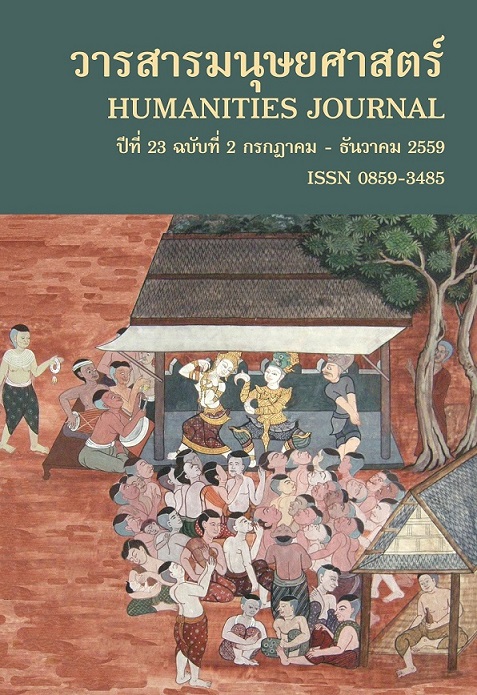การศึกษาความรู้เกี่ยวกับงานช่างฝีมือในพระไตรปิฎกภาษาไทยฉบับมหาจุฬาลงกรณราชวิทยาลัย Essential Knowledge on Craftsmanship Scripted in the Thai Tripitaka, Mahachulalongkorn Rajavidhyalaya University Version
Main Article Content
Abstract
บทความวิชาการนี้มุ่งศึกษาความรู้เกี่ยวกับงานช่างฝีมือในพระไตรปิฎกภาษาไทย ฉบับมหาจุฬาลงกรณราชวิทยาลัยด้วยวิธีการวิจัยเอกสาร ผลการศึกษาพบว่า พระไตรปิฎกฉบับนี้แสดงให้เห็นถึงคลังความรู้งานช่างฝีมือในสังคมก่อนพุทธกาลและสมัยพุทธกาล ผู้เป็นช่างฝีมือก่อนสมัยพุทธกาลคือช่างคฤหัสถ์ที่เป็นอดีตพระโพธิสัตว์ อดีตพระเถรเจ้า ช่างในชาดก ผู้รับจ้าง บริวารบุคคลตระกูลสูง ช่างผู้ประพฤติธรรม สมัยพุทธกาลช่างคฤหัสถ์มีสืบเนื่องมาทั้งช่างหม้อ ช่างทอง ช่างดอกไม้ ช่างเขียน และช่างสงฆ์ด้วยการทำงานช่างฝีมือเครื่องอุปโภคของคฤหัสถ์ เครื่องใช้สำหรับภิกษุ มีความเชื่อว่าการทำกรรมดีถวายทานวัตถุแล้ว เมื่อตายจะได้ขึ้นสวรรค์ มีวิสสุกรรมเป็นเทพแห่งศิลปะและงานช่างฝีมือ ช่างฝีมือเป็นบุคคลตระกูลต่ำ เปรียบเทียบการปฏิบัติธรรมกับอาชีพช่างทอง ช่างหม้อ วิธีการทำงานช่าง ผลงานของช่าง เพื่อสร้างความศรัทธาในพระรัตนตรัย ความชัดเจนในการอธิบายธรรม ความรู้งานช่างฝีมือดังกล่าวแสดงให้เห็นบทบาทความสำคัญ ความเจริญของงานช่างฝีมือสมัยพุทธกาลได้อย่างดี อันเป็นที่มาบางประการของการสร้างงานช่างฝีมือในสังคมไทยสืบทอดมาจนถึงปัจจุบัน
This article presents the results of documentary research aimed to study essential knowledge on craftsmanship in the Mahachulalongkorn Rajavidhyalaya University Thai language version of the Tripitaka – the Holy Canon of Buddhist Scriptures. The Tripitaka reveals knowledge of craftsmanship in the society of pre-Buddha times and in that of the Buddha Period. Craftsmen in the pre-Buddha times were lay craftsmen, including former Bodhisattvas, senior Buddhist monks, craftsmen in the Jataka stories, hired persons, retainers of nobles, and craftsmen who were Dhamma-practitioners. In the Buddha Period, the craftsmen were potters, goldsmiths, floral garland makers, painters and Buddhist Sangha craftsmen with proficiency in creating utensils for lay people and for monks. There was a belief that those who performed meritorious action by offering objects to the Sangha would, when they died, ascend to Heaven. The Omnificient Vishwakarma was the god of the arts and craftsmanship. In traditional society, craftsmen were of low caste. Metaphorically, Dhamma is likened to the skillful practice of the goldsmith and the potter, to the practice of a craft and to the handiwork of craftsmen in order to build up faith in the Triple Gems and to clarify Dhamma. This knowledge of crafts in the Tripitaka indicates clearly the role, the significance and the advanced state of craftsmanship in the time of the Buddha, and this has subsequently contributed to the practice of crafts in Thai society until the present time.


